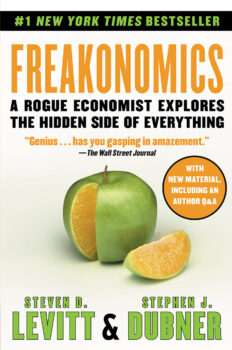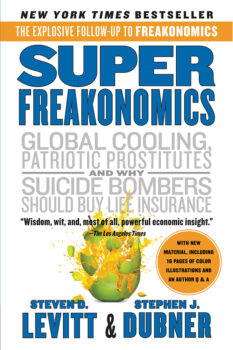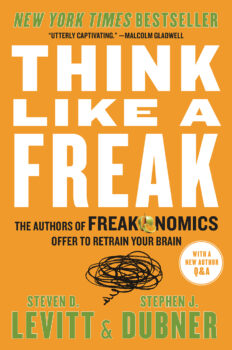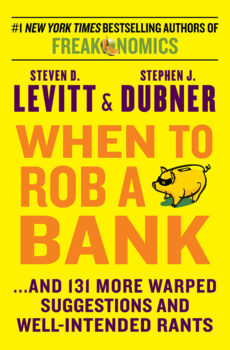Get Started With Freakonomics Radio: Our Most Downloaded Episodes
Welcome to the Freakonomics Radio Network! We’re excited you’re here. As an introduction to the network, we want to share some of the most popular and “freakonomical” episodes of our flagship podcast, Freakonomics Radio. Every week on the show, we dive into everything from the mysteries of human behavior to environmental science, health care, and … napping. (Yes, napping.) Once you listen to these episodes, dive into the archive or check out our other shows No Stupid Questions, People I (Mostly) Admire, and The Economics of Everyday Things. We hope you enjoy. Happy listening!
Most Popular Episodes
- “Air Travel Is a Miracle. Why Do We Hate It?” (Ep. 534): It’s an unnatural activity that has become normal. You’re stuck in a metal tube with hundreds of strangers (and strange smells), defying gravity and racing through the sky. But oh, the places you’ll go! We visit the world’s busiest airport to see how it all comes together. (Part 1 of “Freakonomics Radio Takes to the Skies.”)
- “Why Are There So Many Bad Bosses?” (Ep. 495): People who are good at their jobs routinely get promoted into bigger jobs they’re bad at. We explain why firms keep producing incompetent managers — and why that’s unlikely to change.
- “Why Is Everyone Moving to Dallas?” (Ep. 491): When Stephen Dubner learned that Dallas–Fort Worth will soon overtake Chicago as the third-biggest metro area in the U.S., he got on a plane to find out why. Despite getting stood up by the mayor, nearly drowning on a highway, and eating way too much barbecue, he came away impressed. (Part 1 of 2 — because even podcasts are bigger in Texas.)
- “‘A Fascinating, Sexy, Intellectually Compelling, Unregulated Global Market.’” (Ep. 484): The art market is so opaque and illiquid that it barely functions like a market at all. A handful of big names get all the headlines (and most of the dollars). Beneath the surface is a tangled web of dealers, curators, auction houses, speculators — and, of course, artists. In the first episode of a three-part series, we meet the key players and learn how an obscure, long-dead American painter suddenly became a superstar. (Part 1 of “The Hidden Side of the Art Market.”)
- “What’s Wrong With Shortcuts?” (Ep. 483): You know the saying: “There are no shortcuts in life.” What if that saying is just wrong? In his new book Thinking Better: The Art of the Shortcut in Math and Life, the mathematician Marcus du Sautoy argues that shortcuts can be applied to practically anything: music, psychotherapy, even politics. Our latest installment of the Freakonomics Radio Book Club.
- “Is Venture Capital the Secret Sauce of the American Economy?” (Ep. 482): The U.S. is home to seven of the world’s 10 biggest companies. How did that happen? The answer may come down to two little letters: V.C. Is venture capital good for society, or does it just help the rich get richer? Stephen Dubner invests the time to find out. (This is part of the Freakonomics Radio American Culture series).
- “Is the U.S. Really Less Corrupt Than China?” (Ep. 481): A new book by an unorthodox political scientist argues that the two rivals have more in common than we’d like to admit. It’s just that most American corruption is essentially legal. (This is part of the Freakonomics Radio American Culture series).
- “The Economist’s Guide to Parenting: 10 Years Later” (Ep. 479): In one of the earliest Freakonomics Radio episodes (No. 39!), we asked a bunch of economists with young kids how they approached child-rearing. Now the kids are old enough to talk — and they have a lot to say. We hear about nature vs. nurture, capitalism vs. Marxism, and why you sometimes don’t tell your friends that your father is an economist.
- “How Can We Break Our Addiction to Contempt?” (Ep. 478): Arthur Brooks is an economist who for 10 years ran the American Enterprise Institute, one of the most influential conservative think tanks in the world. He has come to believe there is only one weapon that can defeat our extreme political polarization: love. Is Brooks a fool for thinking this — and are you perhaps his kind of fool?
- “Why Is U.S. Media So Negative?” (Ep. 477): Breaking news! Sources say American journalism exploits our negativity bias to maximize profits, and social media algorithms add fuel to the fire. Stephen Dubner investigates. (This is part of the Freakonomics Radio American Culture series).
- “What Are the Police for, Anyway?” (Ep. 476): The U.S. is an outlier when it comes to policing, as evidenced by more than 1,000 fatal shootings by police each year. But we’re an outlier in other ways too: a heavily-armed populace, a fragile mental-health system, and the fact that we spend so much time in our cars. Add in a history of racism and it’s no surprise that barely half of all Americans have a lot of confidence in the police. So what if we start to think about policing as … philanthropy? (This is part of the Freakonomics Radio American Culture series).
- “Why Does the Richest Country in the World Have So Many Poor Kids?” (Ep. 475): Among O.E.C.D. nations, the U.S. has one of the highest rates of child poverty. How can that be? To find out, Stephen Dubner speaks with a Republican senator, a Democratic mayor, and a large cast of econo-nerds. Along the way, we hear some surprisingly good news: Washington is finally ready to attack the problem head-on. (This is part of the Freakonomics Radio American Culture series).
- “All You Need Is Nudge” (Ep. 474): When Richard Thaler published Nudge in 2008 with co-author Cass Sunstein, the world was just starting to believe in his brand of behavioral economics. How did nudge theory hold up in the face of a global financial meltdown, a pandemic and other existential crises? With the publication of a new, radically updated edition, Thaler tries to persuade Stephen Dubner that nudging is more relevant today than ever.
- “This Is Your Brain on Pollution.” (Ep. 472): Air pollution is estimated to cause 7 million deaths a year and cost the global economy nearly $3 trillion. But is the true cost even higher? Stephen Dubner explores the links between pollution and cognitive function, and enlists two fellow Freakonomics Radio Network hosts in a homegrown experiment.
- “The Pros and Cons of America’s (Extreme) Individualism” (Ep. 470): According to a decades-long research project, the U.S. is not only the most individualistic country on earth; we’re also high on indulgence, short-term thinking, and masculinity (but low on “uncertainty avoidance,” if that makes you feel better). We look at how these traits affect our daily lives and why we couldn’t change them even if we wanted to. (This is part of the Freakonomics Radio American Culture series).
- “The U.S. Is Just Different — So Let’s Stop Pretending We’re Not” (Ep. 469): We often look to other countries for smart policies on education, healthcare, infrastructure, etc. But can a smart policy be simply transplanted into a country as culturally unusual (and as supremely WEIRD) as America?
- “Nap Time for Everyone!” (Ep. 468): The benefits of sleep are by now well established, and yet many people don’t get enough. A new study suggests we should channel our inner toddler and get 30 minutes of shut-eye in the afternoon. But are we ready for a napping revolution?
- “How to Get Anyone to Do Anything” (Ep. 463): The social psychologist Robert Cialdini is a pioneer in the science of persuasion. His 1984 book Influence is a classic, and he has just published an expanded and revised edition. In this episode of The Freakonomics Radio Book Club, he gives a master class in the seven psychological levers that bewitch our rational minds and lead us to buy, behave, or believe without a second thought.
- “Reasons to Be Cheerful” (Ep. 417): Humans have a built-in “negativity bias,” which means we give bad news much more power than good. Would the Covid-19 crisis be an opportune time to reverse this tendency?
- “Two (Totally Opposite) Ways to Save the Planet” (Ep. 346): The environmentalists say we’re doomed if we don’t drastically reduce consumption. The technologists say that human ingenuity can solve just about any problem. A debate that’s been around for decades has become a shouting match. Is anyone right?




